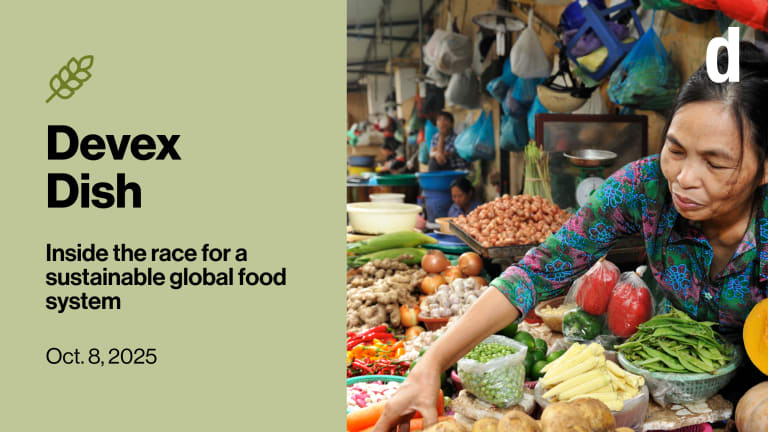
Too often nutrition and agricultural systems are blind to each other — and sustainable growth and development in Africa will remain elusive unless this changes.
Despite the recent boom in agricultural investment in the continent, much of the population still does not have access to affordable and nutritious diets. A stark reminder was delivered by the recently released 2014 Africa Progress Report, which showed that one-quarter of Africans are currently malnourished — just 5 percent less than in 1990. Clearly, when the dial has moved so slowly on such a crucial issue, something is terribly wrong.
Set against this, the World Bank envisions a future in which African farmers and agribusinesses could create a trillion-dollar food market by 2030, given the right conditions. Access to capital, electricity, better technology and irrigated land, could — with the right focus — all support the growth of secure supplies of nutritious foods for a malnourished population.
The lens of the World Economic Forum on Africa and its chosen theme “Delivering on Africa’s promise” last week underlined that we face both an enormous challenge and a huge opportunity. Agriculture and nutrition are tightly tied to the food systems of countries, meaning that both sectors rely on similar sets of conditions, including physical infrastructure, land rights and access to safe, affordable inputs. Moreover, both rely heavily on smallholder farmers for food production.
But we are far from achieving this link, or breaking down the silos. The present disconnect between agriculture and nutrition means that while investment in agriculture deepens through initiatives like the G-8’s New Alliance for Food Security & Nutrition and Grow Africa, malnutrition continues to threaten the long-term prospects of the continent.
Agriculture concentrates on filling the bellies of expanding populations, reducing the cost of production, and managing drought and climate change. Nutrition remains largely a health issue, addressed through a range of interventions delivered through the public health system. Both systems have limited capacity to tackle the nutritional needs of rural agricultural populations or the poorest that are by-passed by public services. At the end of both these chains are African smallholder farmers, workers and consumers, whose poor diets underpin high levels of malnutrition.
The solutions are many and complex, but the starting point is essentially simple — to understand that long-term growth isn’t sustainable if farmers, workers and consumers are malnourished. Indeed, iron, iodine and zinc deficiencies alone are estimated to impact the GDP of a country by two to three percent. In particular, there is evidence that shows anemia reduction can lead to increased productivity of up to 17 percent. The implications are enormous for African countries. According to the African Union, Ethiopia lost an estimated US$4.7 billion in 2009 because of child undernutrition, equivalent to 16.5 percent of their GDP.
Tanzania offers some innovative approaches. The conclusion of the country’s recently launched Agriculture and Nutrition Roadmap — “Delivering nutrition through the agricultural system” — provides a blueprint for catalyzing new business investment in nutrition. It recognizes that the agricultural system is already reaching rural populations with agricultural inputs such as seeds and fertilizers, training and market access programmes. This system could be put to good use in delivering nutritious foods and services to these populations, developing opportunities to scale up production of more nutritious foods, and creating more nutrition-secure food systems for the benefit of the whole population. GAIN is already working with large agricultural exporters to build nutrition improvements for workforces producing crops such as coffee and tea, or for women workers in factories, which export into global markets. This approach can also be built into the way farmers and producers supply Africa’s growing cities.
Smart investments to leverage the agricultural system for nutrition make good business sense. A joined-up approach to business investment in agriculture and nutrition will simultaneously improve diets and food security, and achieve healthier, more productive workforces.
The link between nutrition and agricultural productivity requires greater recognition and understanding. Building the evidence base on nutrition outcomes generated through investments in agriculture with research, monitoring and evaluation will be crucial to justifying more investment to combined agriculture and nutrition programs. This is where the public sector and civil society can play a role.
“Delivering on Africa’s promise” is an admirable and achievable goal. Yet, the sectors of agriculture, nutrition and health have to be much better integrated for positive outcomes. With a strong business case for doing so, there is little reason not to invest in delivering nutrition through agricultural platforms.
The Agriculture and Nutrition Roadmap was co-developed by GAIN and the Southern Agricultural Growth Corridor of Tanzania Centre under the umbrella of the Scaling Up Nutrition Business Network. Follow Marc Van Ameringen on Twitter @GAINExecDir.
Join the Devex community and access more in-depth analysis, breaking news and business advice — and a host of other services — on international development, humanitarian aid and global health.








